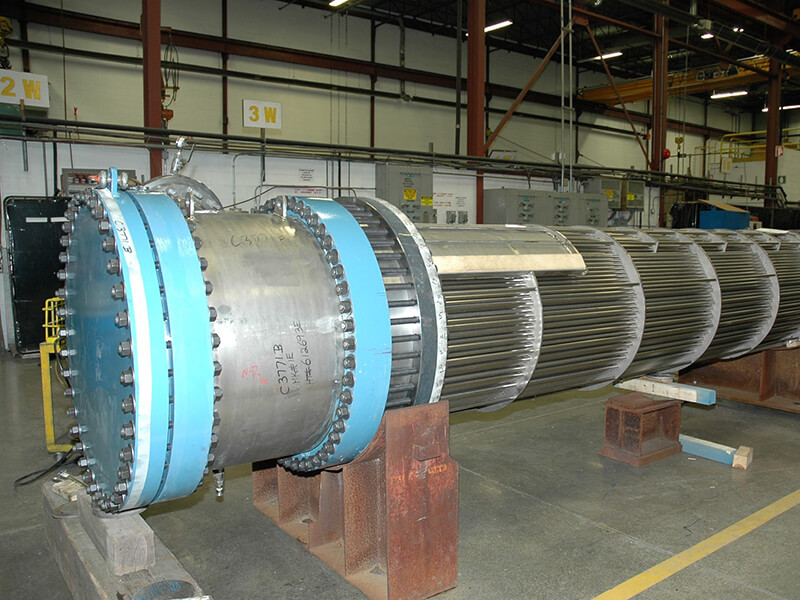In the realm of engineering marvels, the titanium condenser stands as a shining example of innovation. As an essential component in various industries, from power plants to chemical manufacturing, the titanium condenser plays a pivotal role in heat exchange processes.
Understanding Titanium Condensers
A condenser is a device designed to transfer heat from a substance to a cooling medium, causing it to change state from a gas or vapor to a liquid. Titanium condensers employ titanium as the primary material for construction. Titanium, known for its exceptional corrosion resistance, lightweight nature, and high strength-to-weight ratio, makes it an ideal choice for demanding applications where reliability and durability are paramount.
Advantages of Titanium Condensers
- Corrosion Resistance: One of the most significant advantages of titanium condensers is their remarkable resistance to corrosion. Unlike traditional materials like copper or steel, titanium remains unaffected by corrosive environments, including seawater, acidic solutions, and harsh chemicals. This corrosion resistance ensures longevity and reliability, reducing maintenance costs and downtime.
- Lightweight and High Strength: Titanium’s low density coupled with its high strength makes titanium condensers lightweight yet robust. This characteristic is particularly advantageous in applications where weight savings are critical, such as aerospace and marine industries. Additionally, titanium’s exceptional strength allows for the design of compact and efficient condenser systems without compromising performance.
- Thermal Conductivity: While titanium’s thermal conductivity is lower than that of copper or aluminum, it still exhibits sufficient heat transfer capabilities for many applications. Moreover, advancements in titanium alloy formulations and condenser design have further optimized thermal performance, ensuring efficient heat exchange even in demanding environments.
- Biocompatibility: Titanium is biocompatible, meaning it is non-toxic and compatible with biological tissues. This property finds applications in medical devices and pharmaceutical manufacturing, where sterile and corrosion-resistant materials are essential.
- Environmental Sustainability: Titanium is a highly recyclable material, contributing to environmental sustainability. The recyclability of titanium condensers aligns with the growing emphasis on eco-friendly practices across industries, making them an attractive choice for environmentally conscious companies.
Applications of Titanium Condensers
- Power Generation: Titanium condensers play a vital role in power plants, where they facilitate the condensation of steam in steam turbines, converting thermal energy into mechanical work. Whether in fossil fuel-based power plants or nuclear reactors, titanium condensers ensure efficient heat transfer, enhancing overall energy conversion efficiency.
- Chemical Processing: In chemical manufacturing and petrochemical industries, titanium condensers are utilized in various processes, including distillation, reflux condensation, and vapor recovery. Their corrosion resistance and thermal stability make them well-suited for handling aggressive chemicals and high-temperature operations.
- Desalination: The desalination of seawater to produce freshwater is a critical process in regions facing water scarcity. Titanium condensers are integral components in desalination plants, where they facilitate the condensation of vaporized water, ensuring the production of high-quality freshwater with minimal energy consumption.
- Pharmaceuticals and Biotechnology: Titanium condensers find applications in pharmaceutical manufacturing, where sterile processing conditions are essential. Their corrosion resistance and biocompatibility make them suitable for use in reactors, evaporators, and other process equipment involved in drug synthesis and purification.
- Food and Beverage Industry: In food processing and beverage production, titanium condensers are employed for tasks such as pasteurization, sterilization, and concentration. Their hygienic properties, coupled with resistance to food acids and sanitizing agents, make them indispensable in maintaining product quality and safety.
Future Prospects and Innovations
The evolution of titanium condensers continues with ongoing research and development efforts aimed at enhancing performance, reducing costs, and expanding their applicability. Advanced manufacturing techniques, such as additive manufacturing (3D printing), enable the production of complex geometries and customized designs, further optimizing heat transfer efficiency and system integration.
Furthermore, ongoing exploration into novel titanium alloys and surface treatments promises to push the boundaries of corrosion resistance and thermal conductivity, opening new avenues for titanium condenser applications in extreme environments and emerging industries.
In conclusion, titanium condensers represent a pinnacle of engineering innovation, offering unparalleled corrosion resistance, lightweight design, and thermal efficiency. From power generation and chemical processing to desalination and biotechnology, titanium condensers play a crucial role in diverse industries, driving progress and sustainability.
